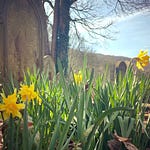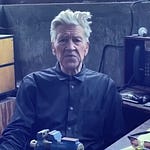Image: Ana Mendieta, Imágen de Yágul, 1973/2018. Colour photograph. © The Estate of Ana Mendieta Collection, LLC. Courtesy Galerie Lelong & Co.
Last Spring, a horticulturalist friend gave me a hellebore cutting for my birthday. I planted the stalk bearing a star of seven dark leaves in the small patch of earth by my front door and waited for it to grow. All summer I kept it watered and cleared of the forget-me-knots that threatened to choke it. But nothing. In the autumn, I pressed handfuls of well-rotted manure into its roots. Still nothing. By the time Spring rolled around once more, the cutting was stiff and blackened with death. I was all set to dig it up and throw it on the compost when I noticed the tiniest of shoots growing from its corpse.
It was around this time that I also began a new writing project. This project is new, in the sense that, like the hellebore shoot drinking the sun in my front garden, it’s still very much emergent. Also, like the shoot, I know the species of this writing project (an autobiographical novel) but have no idea what shape it will take, how many flowers it will produce or what hue they will be. However, again like the hellebore, this new project is also the continuation of something old. So, this new autobiographical novel has been born of a ‘cutting’ taken from the many short stories I wrote over a seven-year period as part of my PhD in applying Jungian psychoanalysis to creative writing.
These stories were experiments in cultivating a hybrid of depth psychology and memoir in order to find a way to tell the story of growing up with a mother who did not know how to love while also exploring how writing about it could be a way of healing. Meanwhile, the stories I wrote as part of my doctorate in turn emerged from the corpse of the novel I wrote in my thirties, in which the first thing I did was kill off the heroine’s mother – unconsciously expressing a desire to ‘kill off’ my own mother as a way to avoid facing the difficult emotions behind our entanglement.
With this novel sitting in a folder on my desktop gathering digital dust, I embarked on my PhD, hopeful that this time, my efforts would end up on the desks of agents, publishers and readers, instead. But far from being a perfectly formed bouquet of publication-ready short stories, what I actually produced was a series of creative experiments akin to a straggly wild rose, shedding petals to the wind. In the middle of it all, this experience was an immensely challenging lesson in letting go of my attachment to outcome, to perfection, to external markers of success. Undergoing this wild process was one of the hardest things I have ever done - intellectually, creatively, emotionally and psychologically (just ask my unbelievably patient husband who I was fortunate enough to have come on this journey with me).
Now it’s Spring again and I’m starting anew again with a cutting of a cutting of a cutting and it’s terrifying. Terrifying because of the death-seeking part of me that would rather not write than risk failure. The part of me who is the inner cruel mother shouting hoarsely in my ear - how do you know you won’t find yourself back at the beginning yet again another five, ten years from now with nothing to show for it except a pair of sore wrists from decades of typing into the abyss?
Now it’s Spring and I’m writing again this story, which is a new story, but also the same story that I’ve been trying to write in different forms for years and I’m taking comfort from the androgynous protagonist of Virginia Woolf’s experimental novel, Orlando.
In the same way that Jungian psychoanalysis views the self as fluid and transpersonal, trading borders between dimensions and realities, Orlando is a beautifully complex novel about gender and the myriad selves a person might be over the course of a lifetime, set across many lands, sexes and centuries.
It is also a manifesto on writing and creativity. Specifically, it is a novel about the images and stories we are born with that, one way or another, we are destined to give expression to. And it’s about how these seeds of our creative potential insist on evolving throughout the many seasons of our lives to find their purest, most authentic, arresting expression in a way that requires both effort and surrender.
For Orlando it was his/her poem The Oak Tree, which begins in Elizabethan England with Orlando as a boy dreaming of tying his heart to his favourite oak. The Oak Tree: A Poem survives as many re-writes as it does centuries, changing from poetry to prose and back again, and from melancholy to satire over its 300-year life, as Orlando also changes. By the time Orlando buries it under the oak tree that inspired it, the poem is unrecognisable, while it finds its completion in being returned to the earth where it is left to decay.
For Carl Jung the oak tree is a both symbol of the Self, which is the unchanging part of who we are at our core, and a metaphor for the transformational journey of individuation, which involves the many versions and ‘re-writes’ of ourselves we must travel through and, perhaps sometimes scratch out, in order to become this truest version of who we really are.
In many ways Jung’s ‘oak tree’ was his repetitive drawings of mandalas (graphic representations of the spiritual journey from inner to outer originating from Buddhism) which he drew again and again while writing The Red Book and refining his theory of the collective unconscious over a sixteen-year period. (Repeatedly finding himself on the brink of breakdown, questioning his own sanity, in the process).
So, it’s Spring again and I’m back at the beginning again, growing the shoots of a new story from the cuttings of old stories, composting characters and scenes, images and themes, re-constituting their cellular qualities and traits into the novel which is my mandala, my The Oak Tree: A Poem.
This new novel, that is also the continuation of all my old writing, opens with me being swallowed by my mother. I tumble down the dark shaft of her throat to find myself trapped in a body which doubles as the house from the nightmares that have haunted me for years. Like the character of Orlando, in this novel, the character who is me is also trying to write - mirroring the experience of death and re-birth that’s at the heart of the creative process inside the story. Which is also a way, in this fictional place, of getting up the nerve to face my worst fears.
My inner cruel mother is right here with me, both as an inhabitant of this shadowy nocturnal house and – because she is infuriatingly capable of being in two places at once – at my shoulder as I write.
But as I descend, along with the character who is me, into the depths of this damp, dark house, the question I’m asking is: what does success look like? Is it getting published, gaining recognition, winning prizes? Or is it allowing myself to be broken open by the process – the failures and the daily ‘deaths’ – to make space for the story, stored in my bones from the day I was born, that wants to write itself through me?
Creative Experiments
1. What is your ‘oak tree’? Write its story.
2. What seeds of new life, projects & beginnings are currently emerging through you? What had to die (or needs to die) to make way for it? What questions is this new beginning/project provoking? What challenges and risks does it entail? What deeper lessons is it inviting?
What symbols or images represent this new project/beginning? Use one or more as a starting point for a poem. Or simply write a ‘stream of consciousness’ in response to their characteristics, associations and traits.
Depth Writing Online Workshop - Mon May 13th
7-8.15pm GMT
Join a small but growing international community to discuss the ideas in this post and do the writing exercises together in a friendly, supported online space.
The workshop will include a short introduction, approx 30 minutes writing time and sharing in small groups. The focus will be on process rather than outcome and there will no pressure to read anything out. This means no previous writing experience is necessary for you to benefit from the workshop. All you need is a spirit of curiosity and adventure!
Pay-what-you-can £7-£10. book tickets here
FREE to paid subscribers (the meeting link will be sent in a separate post)














Share this post